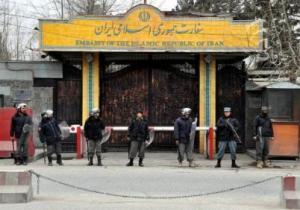Drug War Issues
Politics & Advocacy
Amnesty International has called on Iran to stop executing people for drug offenses, saying the Islamic Republic has embarked on "a killing spree of staggering proportions."

Afghan police guard the Iranian Embassy during January 2011 protests against Iranian executions of Afghans (wikimedia.org
Bordering Afghanistan and its bountiful opium poppy crop, Iran is burdened with one of the world's highest rates of opiate addiction and drug-related deaths. It is also a key transshipment point for Afghan opium and heroin bound for European markets.
"To try to contain their immense drug problem, the Iranian authorities have carried out a killing spree of staggering proportions, when there is no evidence that execution prevents drug smuggling any more effectively than imprisonment," said Amnesty's Interim Middle East and North Africa deputy director, Ann Harrison. "Drug offenses go much of the way to accounting for the steep rise in executions we have seen in the last 18 months," Harrison said.
Amnesty said it began to receive credible reports of a new wave of drug executions in the middle of 2010, including reports of mass executions at Vakilabad Prison in Mashhad, with one, on August 4, 2010, involving at least 89 people. While Iran officially acknowledged 253 executions in 2010, of which 172 were for drug offenses, Amnesty said it has credible reports of another 300 executions, "the vast majority believed to be for drug-related offenses."
"Ultimately, Iran must abolish the death penalty for all crimes, but stopping the practice of executing drug offenders, which violates international law, would as a first step cut the overall number significantly," said Harrison.
Iran maintains that the death penalty is critical for maintaining law and order and that it is applied only after scrupulous legal proceedings. But Amnesty said it had received credible reports of executions without trial, of confessions achieved by torture, and of failure to notify families -- or even inmates -- of impending execution. It said those executed tended to be poor or from minority groups or outside the country, and that some 4,000 Afghans were on death row for drug offenses.
Iran receives significant international support in its war on drugs. The UN Office on Drugs and Crime has provided $22 million since 2005 to support training for Iranian anti-drug forces, while the European Union is providing $12.3 million for an Iran-based project to strengthen regional anti-drug cooperation. Belgium, Denmark, France, Germany, Ireland, and Japan have all provided anti-drug assistance to Iran via UNODC programs.
The UNODC technical assistance program is supposed to include work to promote reforming the Iranian justice system to bring it in line with international standards. But when he visited Iran in July, UNODC executive director Yury Fedetov didn't mention the rising number of executions as he praised Iran's anti-drug efforts.
"All countries and international organizations helping the Iranian authorities arrest more people for alleged drugs offenses need to take a long hard look at the potential impact of that assistance and what they could do to stop this surge of executions," said Harrison. "They cannot simply look the other way while hundreds of impoverished people are killed each year without fair trials, many only learning their fates a few hours before their deaths."
This work by StoptheDrugWar.org is licensed under Creative Commons Attribution-ShareAlike 4.0 International
Comments
Rx for Iran vs opium
In the 1970's high quality Afghan hashish was legendary; US "drug fighting support" helped eradicate the industry, since replaced with opium; "drug fighting support" to Iran to counter opium appears to be supporting executions, etc. etc. etc.
If US advisors were sent to help Afghan farmers reinstate the cannabis crop-- but this time instead of smugglable hashish make it into
(a) sifted grades for use in a vaporizer or 25-mg screened one-hitter, or
(b) tincture, liquid formula etc. for use in an cannabinoid e-cigarette cartridge,
the opiate crop could be eliminated in a year saving our Supreme Leader and his friends a lot of trouble.
The irony is that the IRGC
The irony is that the IRGC (Islamic Republic Guard Core) maintains a very strict a profitable black market when it comes to drugs of abuse (primarily opiates). I fully believe that the Iranian drug problem is not an accident nor a coincidence but a mechanism by which the regime can control a population (70% of whom are under the age of 25) with addiction to powerful narcotics. Why were the rates considerably lower under the Shah's reign? I am not a monarchist nor pro-Islamic Republic but one must ask how this country, rich with natural resources has brought up a generation who have NO hope in life?
Add new comment